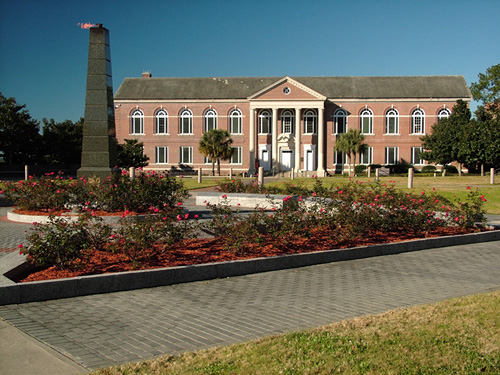Slavery on campus – recovering the history of Washington College’s discarded slaves

Kelley Deetz, University of Virginia and Alfred L. Brophy, University of North Carolina – Chapel Hill
When First Lady Michelle Obama reminded Americans during the Democratic National Convention that she lives in a house literally built by slaves, it once again sparked discussion of slavery in the United States’ history.
The White House is not the only famous building built by enslaved African-Americans. Slaves and the wealth created by their forced labor were used to build many American institutions. For example, the Smithsonian Institution’s storied “castle” was built using limestone quarried by slaves. Universities too benefited from slavery and enslaved labor.
We are slavery scholars who are attempting a challenging task – helping recover the lost stories of those individuals who built some of America’s oldest institutions.
Building schools with slavery
Donors made rich by the products of slave labor endowed schools in the North and South. Sometimes those donors willed enslaved laborers to schools and to churches. That is how a religious order – the Jesuits – ended up as owner of hundreds of enslaved humans in Maryland in the 1830s.
In 1838, Jesuits sold 272 such enslaved humans. Many of those people ended up in Louisiana, where slave labor was needed to provide the labor for cotton and sugar plantations.
Meanwhile, the proceeds from the sale were used to fund buildings on Georgetown University’s campus.
The sale of humans to endow Georgetown is only one of the most dramatic examples of how wealth made from slavery supported education and universities. In some years the vast majority of students at the University of Alabama came from slave-owning families. Even at less elite southern colleges, more than 50 percent of students came from slave-owning families.
The profits from slavery funded education. Indeed, this was often an explicit part of the wills left behind by slave owners. For example, when one Alabama slave owner, Absalom Morton, died in 1845, his will instructed that his slave, David, be rented out and the profits used for his cousin’s education.
Faculty, too, owned enslaved African-Americans.
For instance, Frederick Barnard, the namesake of Barnard College in New York City, owned several female slaves when he was the chancellor of the University of Mississippi before the Civil War.
Faculty throughout the South wrote and taught about the need for slavery, and that it was consistent with morality and natural law.
The story of Washington and Lee University
Schools did their part to promote slavery as well. For example, in 1825 when slave owner John Robinson died, Washington College (now known as Washington and Lee University) in Virginia’s Shenandoah Valley inherited about 80 people from him.
This is the story we’ve been looking to tell: Robinson instructed the college to not sell the slaves for 50 years. He further instructed that the “strictest regard be paid to (the slaves’) comfort and happiness.”

Robinson Slave Provision. Alfred Brophy, CC BY
But when the college found that renting them proved a burden, it sold about 50 of them to Samuel Garland of Lynchburg, Virginia for about $US20,000.00, roughly $500,000 in today’s dollars.
Some of the money was used for a new building on campus, still known as Robinson Hall. Recently Washington and Lee University placed a memorial to them outside Robinson Hall.

Robinson Monument, Washington and Lee. Alfred Brophy, CC BY
What happened to the Washington College slaves?
Samuel Garland bought these slaves to work on his family land in Hinds County, Mississippi. So, Washington College’s slaves most likely walked from their home near the James River in Lexington, Virginia, down through Knoxville and then on to the Garland land in Mississippi, a journey of around 800 miles.

Robinson Hall, Washington and Lee University. Alfred Brophy, CC BY
Samuel Garland made a fortune in Mississippi off enslaved labor. But like many who made their fortunes in the deep South, he used his money to live in Virginia. He built a mansion on “Garland Hill” in Lynchburg. By the time of his death in 1861, Samuel Garland had slaves on two plantations in Hinds County and another one in Coahoma County.
Rebuilding lost histories
But no one should forget that these are just dramatic vignettes about a system that held millions in bondage.
Hundreds of thousands of humans were sold as chattel and moved from the upper South to the lower South of Georgia, Alabama, Mississippi and Louisiana before the Civil War. Families were ripped apart and tremendous efforts were exerted to reunite after emancipation.

Millions were held in bondage. Slave quarters at the Whitney Plantation in Wallace, Louisiana. Edmund Fountain/Reuters
What happened to those families?
Last year, Georgetown started to track down the descendants of those enslaved people who were sold by the Jesuits. This spring they found some of the descendants of those people sold nearly 200 ago. Many live in Louisiana and some have retained the Catholic faith of their ancestors.
In the past few months those descendants, officials at Georgetown and many others have been asking what should be done about that legacy of slavery.
The New York Times editorial board suggested one form of repair should be scholarships for descendants who attend Georgetown. Georgetown’s president has met with some descendants and is listening to their ideas about how best to acknowledge and repair this legacy.
That leads to questions about other schools, too. What happened to those dozens of enslaved African-Americans who were forced to leave their homes and walk 800 miles to labor on Garland’s plantations?
What did it mean to be torn away from family and friends? To be uprooted after the promise of remaining near all they knew?
Looking for descendants
We are writing about this in part because we want to remind people that there are many such stories of slavery and uprooting, of pain and sorrow, of perseverance and strength.

Legacy of slavery: statues of child slaves at the Whitney Plantation in Wallace, Louisiana. Edmund Fountain/Reuters
In the stories of a few we can trace the trajectory of our nation’s history, reconnect families and attempt to confront the demons of our collective pasts. If we wait any longer these memories and connections will be lost.
Many don’t want to remember. And that is understandable.
As historians we want to provide maps for those who do want to know now, and for those who will want to know in the future.
We are looking for people who are descended from those enslaved African-Americans once owned by John Robinson, then by Washington College and later by the Garland family. In an effort to capture any memories passed down through the generations, and to possibly reconnect relatives, we want to interview anyone who knows anything about these people and their families.
If you or anyone you know is willing to speak with us please contact us at [email protected].
![]()
Kelley Deetz, Research Associate for the President’s Commission on Slavery, University of Virginia and Alfred L. Brophy, Judge John J. Parker Distinguished Professor of Law, University of North Carolina – Chapel Hill
This article was originally published on The Conversation. Read the original article.





